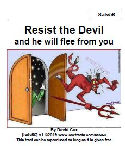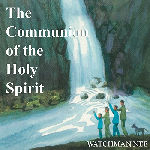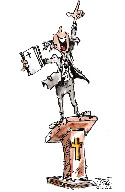Ads
Study on the False Prophets of 2 Peter 2:1 is a commentary on this verse, examining false prophets.
2 Peter 2:1 But there were false prophets also among the people, even as there shall be false teachers among you, who privily shall bring in damnable heresies, even denying the Lord that bought them, and bring upon themselves swift destruction.
Contents
Existence of False Prophets
The first point we need to make is the existence of false prophets. They exist. Jesus planted this central truth in Matthew 7, and Peter-s words echo that same passage. The idea is that there are people who wish and work harm for the people of God, as well as the general population. They are labeled “false prophets,” which are people (prophets which are spokesmen for God,) yet they are not true in their representation of themselves. They do not speak or represent the truth of God, nor the messages of God.
“Also” in this verse indicates that Peter is making a contrast. There are good spokesmen for God among the people of God, but there are “also” evil workers hiding amongst the people of God.
Their Presence among the People of God
Secondly, these false prophets are among the people. They are among us, very close and dangerous to us. Yet they deliberately disguise themselves and their work so that they appear to just be normal “good” people, or worse, disguised as being God’s prophets.
Their Deceptive Practices
Zechariah 13:4 refers to the Old Testament false prophets as wearing “a rough garment to deceive“, identifying with the sacrifice of a prophet when it is not true in their own lives. Paul conveys the same concept in Galatians 2:4, “false brethren brought in unawares.” Jude also conveys this deception of the false prophet in Jude 1:4 For there are certain men crept in unawares, who were before of old ordained to this condemnation, ungodly men, turning the grace of our God into lasciviousness, and denying the only Lord God, and our Lord Jesus Christ. This point reveals the truth about these people, while pretending to be good Christians, experts at understanding God, the principles of God, and the message of God, i.e. the Bible, they are not any of that. Peter compares these with the same type of situation in the Old Testament when there were present among the nation of Israel false prophets that tried to pull the heart and devotion of the nation after others gods.
We should compare the biblical warning for these with the same false prophet warnings in the Old Testament.
Ahab (1 Kings 22:12 “And all the prophets prophesied so, saying, Go up to Ramothgilead, and prosper: for the LORD shall deliver it into the king’s hand.”), or Isaiah (Isaiah 9:15 “The ancient and honorable, he is the head; and the prophet that teaches lies, he is the tail.), Isaiah 28:7 “But they also have erred through wine, and through strong drink are out of the way; the priest and the prophet have erred through strong drink, they are swallowed up of wine, they are out of the way through strong drink; they err in vision, they stumble in judgment.”), or Jeremiah (Jeremiah 14:14 “Then the LORD said to me, The prophets prophesy lies in my name: I sent them not, neither have I commanded them, neither spoke to them: they prophesy to you a false vision and divination, and a thing of nothing, and the deceit of their heart.”); Jeremiah 27:10 “For they prophesy a lie to you, to remove you far from your land; and that I should drive you out, and you should perish.”), or Ezekiel (Ezekiel 13:3 “Thus said the Lord GOD; Woe to the foolish prophets, that follow their own spirit, and have seen nothing!”), or Zechariah (Zechariah 13:4 “And it shall come to pass in that day, that the prophets shall be ashamed every one of his vision, when he has prophesied; neither shall they wear a rough garment to deceive:”), or to those who in his own time had deceived the “people” (the distinctive term for “Israel”) in Jerusalem. The warnings against false prophets in our Lord’s discourses (Matthew 7:22 “Many will say to me in that day, Lord, Lord, have we not prophesied in your name? and in your name have cast out devils? and in your name done many wonderful works?”); Matthew 24:24 “For there shall arise false Christs, and false prophets, and shall show great signs and wonders; so that, if it were possible, they shall deceive the very elect.“), and the like warnings in 1 John 4:1 “Beloved, believe not every spirit, but try the spirits whether they are of God: because many false prophets are gone out into the world.“), (Cambridge Bible School and Colleges Commentary on 2 Peter 2:1)
The Definition of False Prophet
“False prophets” mainly refers to a prophet (person presenting themselves as speaking for God) who do not have a divine commission to do so nor do they have the correct message of God, rather a heresy. Heresy comes from the idea of causing or augmenting a division between people. True doctrine unites people into one under God’s authority and direction. They get along together among themselves because all seek God’s will. The teaching that these false prophets do cause people to exalt their own opinions and points of view to dominate over others, causing this division or heresy.
False Prophets Activity – Teaching, Persuasion
Thirdly, Peter switches from prophet or God´s spokesmen to identifying them as teachers. Their activity is identified as convincing the people of “damnable heresies.” They “spoke”. This is set in contrast to the true prophet of God who spoke as he was moved by the Spirit of God. That activity can only happen when the true prophet has a correct and healthy relationship with God. There is a very real and strong power when a message speaks in representation of a great authority. This power and speech, or message from the authority, has to be attended to with respect and analysis. The people have to understand the message because there are always directives for them personally. All of these reinforces the accompanying power and sway over the people that the message from the authority carries.
They do not Qualify as a real Prophet of God
But these false prophets have no such relationship with God, but desire the power over the people as a true prophet. Herein lies their great danger to the people. The people listen to and obey what the false prophets are speaking when it is not the will of God. But the key here is that the false prophets’ message, these damnable heresies, also do not convey the proper and true moral character of God.
Moreover, we need to carefully distinguish the false prophet from the prophet who makes a mistake. In the latter case, the prophet may be an actual man of God, called legitimately into the ministry of speaking for God. Sometimes these ministers make mistakes. But Peter is not referring to this. Peter is referring to a person not called of God, who does not understand nor represent in his word the actual message of God. He is a fake, a fraud. A hypocrite, someone who pretends to be what he is not in actuality.
They teach Heresy
A “heresy” originally meant a choice. This is a group, party, or thinking to which people align themselves with that thing to promote. We see this use in that of the “sect of the Sadducees” Acts 15:5 and of the Pharisees in Acts 24:5. (See also Acts 5:17; 26:5; 28:22; 1 Corinthians 11:19)There is a strong idea in this word of a person’s strong will towards something. He is “willful.” Paul uses the concept in Titus 3:10 “a man that is a heretic.” The word for Lord here in 2 Peter is δεσπότης, which has the idea of person who has the rule over others. The willful person is in rebellion to that lawful authority, and this describes the heretic, the false prophet.
Notice the contrast. The false prophet BOTH wants to influence the people of God and negate other prophets of God who preach and teach truth. They want to somehow cause the people of God to despise and reject good teachers and insert themselves in their place. The false prophet does not have sound doctrine nor the calling of God, and so he does this in an illegitimate manner.
Many Christians misunderstand the spiritual battle that they are waging. They think that they have to obey God’s will, which to them, they see no real reason in that will except that God is the boss, and if they obey, then God will after the fact bless them, and if they disobey then after the fact God will punish them. This is an error, a misunderstanding. The will of God has within itself the blessing of God. Also, to not obey God’s will has within that position a curse, something that harms that person both spiritually (separation from the God of all blessing) and physically. God can, does, and will make royal judgments on judgment day, but within righteousness there is inherent blessing in real time, and within sin there is inherent harm in real time. Then there is the judgment of God at the end. Heresy, division or schism, has inherent damage to the people involved in real time. Moreover, that unbiblical separation causes loss to other people because they are not benefitted by that communion or unity that God wants, which is God’s will. That judgment will come on judgment day, while the immediate harm is to the person causing the schism or division.
These heresies are brought in “privily”, in a hidden and deceptive way. Their message was tainted as being not a true message of God, and the method in which they promoted said tainted message was in a way that was deceptive. The open and right way to present a message from God is to compare that message with the person of God. Seeing the moral character of God first, and then understanding that we are to imitate God is the only correct way to present a message from God. Equally involved and important within their process of giving a message from God is that the Word of God (the Bible) has to be a central point of revelation and understanding in this message.
These heresies are furthermore identified as “denying the Lord that bought them.” The point here is very simple. Our Savior has particular moral character traits that identify the Savior (the correct word here is our Messiah or Christ). What the net effect of these false prophet teachers is to cause sin in the people, improper moral character, which doesn’t represent the moral character of God, and specifically of the Savior.
God Condemns them to Destruction
Peter then proceeds to speak of their condemnation by God, “their destruction.” Both their teachings (heresies) and their destiny are aimed at destruction of the human soul.
More Posts on False Prophets
- A Short Definition of a False Prophet
- A study on False Prophets and Teachers
- Biblical Overview of Covetousness
- Contrast of a False Prophet and a Pastor
- Covetousness doesn’t mix with God’s Work
- Covetousness is Idolatry
- Covetousness, Topical References
- F.P. Examining Leadership Models
- False Prophets and Teachers Overview (updated 1/28/2022)
- False Prophets Are Greedy, Covetousness
- False Prophets Are Guided by Demons
- False Prophets Are Proud Arrogant v2
- False Prophets Are Unoriginal, Plagiarists
- False Prophets are Unsaved
- False Prophets lord over other’s salvation Commentary
- False Prophets Preach a Substitute Message
- False Prophets Produce Bad Fruit
- False Prophets Worship Another God
- False Prophets, Introduction and Overview
- FP: Catching the False Prophet with his hand in the Cookie Jar
- FP: Contrast of True Christ and false christs
- FP: False prophets worship other gods
- FP: Fruit of a False Prophet Disobedience Part 8
- FP: Fruit of a False Prophet other gods part 5
- FP: Fruit of a False Prophet Repentance part 6
More Posts under the Profile of the False Prophet Category
- Covetousness, Topical References
- False Prophets Are Greedy, Covetousness
- False Prophets Are Guided by Demons
- False Prophets Are Proud Arrogant v2
- False Prophets Are Unoriginal, Plagiarists
- False Prophets are Unsaved
- False Prophets Preach a Substitute Message
- False Prophets Produce Bad Fruit
- False Prophets Worship Another God
- Overview of Profile of the False Prophet Part 1
Read Tracts about False Prophets and the True Man of God
- ch16 Example of the man of God
- ch19 Marks of a False Prophet
- ch22 Pastorless Flocks
- ch23 Paying the Pastor
- ch24 The power of an example
- ch26 Don’t touch the anointed of God
- ch30 Man of God must not be contentious
- ch31 3Bs of success: buildings, bodies, and bucks
- ch38 Recognizing a good pastor
- ch39 What should we preach?
- ch41 The marks of a bad minister
- ch42 Destitution of Pastor
- ch43 Time to leave your church?
- ch47 The Christian and His Money
- ch49 The Biblical Pastor: The Biblical Duty
- ch51 Cowboys versus Shepherds







